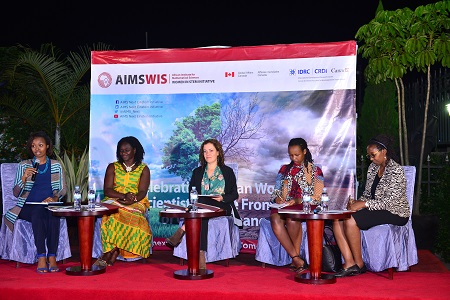
Kigali— 11 February 2019 — At an event to mark the International Day of Women and Girls in Science, the African Institute for Mathematical Sciences (AIMS) launched a special publication “New Interventions for a Changing World” to celebrate African women scientists in climate science.
The publication will be an annual effort managed by the AIMS Mathematical Sciences for Climate Change Resilience (MS4CR) program which works with scholars and researchers seeking solutions to global climate change challenges.
More specifically, MS4CR is geared towards increasing the interest of girls and women in Science, Technology, Engineering and Mathematics (STEM) and climate change science in particular, to grow the pool of future climate scientists.
The theme for the 2019 International Day for Women and Girls in Science celebration is “Investment in Women and Girls in Science for Inclusive Green Growth.” Science and gender equity are both vital for the achievement of the internationally agreed development goals, including the 2030 Agenda for Sustainable Development.
Working in alignment with continental frameworks and priorities such as the Kigali Amendment to the Montreal Protocol, Agenda 2063, the STISA1 2024 and the Maputo Protocol, AIMS is devoted to supporting girls and women in their endeavor to apply science in the drive to finding solutions to climate change challenges in Africa.
The launch in Kigali also featured a panel discussion involving two scientists highlighted in the publication who discussed among others, some of the reasons women leave the sciences, despite having equal ability and passion.
One of the scientists, Dr. Nana Ama Browne Klutse, a Senior Research Scientist at the Space Science and Technology Institute of the Ghana Atomic Energy Commission, underscored the importance of recognizing and applauding women who are excelling in the field of sciences, in spite of the barriers they face.
“Considering the challenges girls experience at school and in society, it is important to celebrate and applaud those who stay on track to ultimately excel in the sciences,” she said.
From Namibia, Dr. Jessica Nosizwe Paula Rose Thorn, who is also featured in the newly launched publication, noted, “Women have more chances in this day and age to take become whatever they want. It is therefore important to create and support more platforms that give girls and women a chance to realize their potential in all aspects.”
Dr. Thorn works to protect essential ecosystem services of importance to humanity, improve resilience to global environmental change, and manage trade-offs between those priorities in smallholder, urban and mountain systems.
Eng. Collete Ruhamya, the Director General of Rwanda Environment Management Authority (REMA) and water businesswoman Yvette Ishimwe were the other panelists.
Ishimwe was passionate about sciences until senior six. Then at university, she decided to pursue business management. But science caught up to her after an encounter with a water shortage problem in her community. Building on her science lessons in secondary school, she has since built a social enterprise that treats and supplies clean water to communities at affordable prices.
In 2017, Ishimwe won the Queen’s Young Leaders’ award which celebrates inspiring young people from all over the Commonwealth that are dedicated to driving change in their communities and beyond.
“You could say, sciences pursued me as opposed to me pursuing sciences. My experience shows us that we can still get involved in science related practice even if we are not mathematicians, physicians or doctors,” said Ishimwe.

